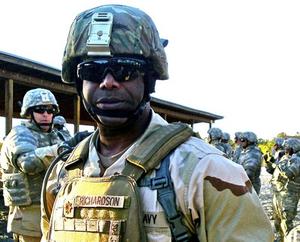CBPVet alleges supervisors at CBP IA ignored his disability: “He Just needed an ounce of compassion” -- Pt. 1
J. Gregory Richardson, a Lieutenant Commander in the Navy (Retired) who injured his back on his last deployments, says that when he served a Senior Security Analyst t Customs and Border Protection Internal Affairs (CBP IA) from 2006 until 2013, supervisors there repeatedly ignored his status as a disabled veteran despite extensive documentation of his medical condition. A fellow CBP IA employee agrees: “he (Richardson) just needed an ounce of compassion” from his supervisors, she said. This veteran never received an ounce of compassion, however, or any other consideration or accommodation. He appears to have been set adrift in the complexities of the federal employment procedures and policies process.

Lt. Cdr. J. Gregory Richardson, U.S. Navy (Retired) // Source: R. L. Maril
J. Gregory Richardson, who held positions as a Senior Security Analyst at Customs and Border Protection Internal Affairs (CBP IA) from 2006 until 2013, alleges supervisors there repeatedly ignored his status as a disabled veteran despite extensive documentation of his medical condition. A Lieutenant Commander in the Navy (Retired) who injured his back on his last deployments, Richardson appears, according to a co-worker two cubicles from his, to have been situated in a federal agency culture impervious to the medical disability experienced while serving his country.
Says this co-worker, also a Senior Security Analyst at CBP IA, “he (Richardson) just needed an ounce of compassion” from his supervisors.
But Mr. Richardson, a decorated career officer with almost three decades of service in the Air Force and the Navy, alleges he received no such considerations at all from his supervisors and, instead, they attempted to procedurally force him out of the CBP IA.
Richardson never thought this kind of treatment by a federal agency was possible. In every sense of the word, he claims he always had followed rules and policies throughout his entire military career. He says he also followed all rules and polices at CBP IA, including notifying his superiors of his documented disability. But his medical disability and demonstrated pain appeared not to matter at all to his supervisors.
Enlisting out of high school with the Air Force in 1981, Richardson rose to the rank of Technical Sergeant in a system he believed promised to promote him based upon merit and, as well, to provide him with appropriate and necessary medical care while he was serving in the military and after his service ended.
Richardson also expected, after successfully working for the CBP IA, for his new medical condition as a disabled veteran to be acknowledged by his superiors and for his special needs to be met so he could perform to the high standards characterizing his military career. According to Richardson, his annual performance evaluations at CBP IA were more than satisfactory prior to a disabling injury while deployed with his Navy unit in Africa.
